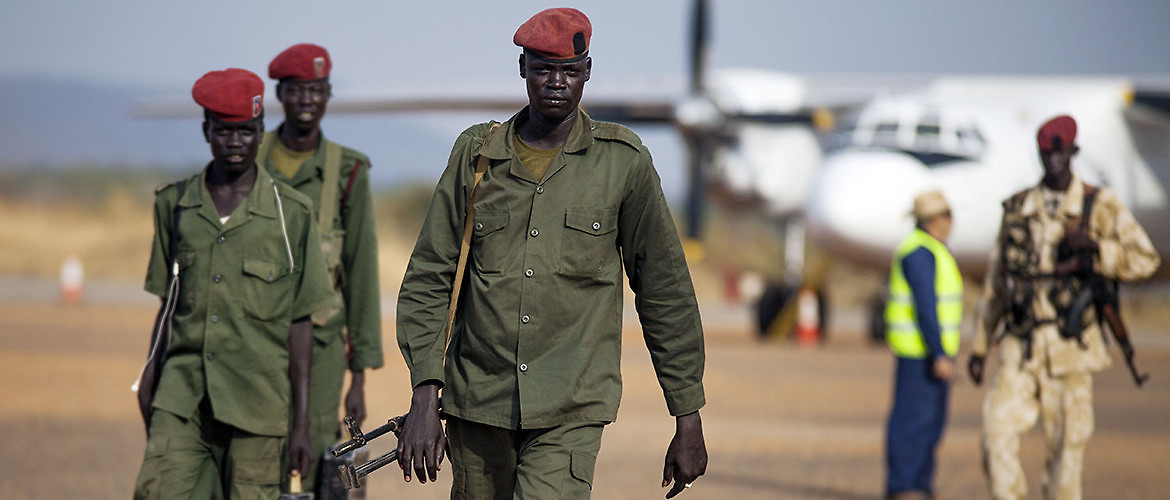Sudan People's Liberation Army troops arrive in Juba, after leaving rebel-controlled areas under the terms of the 2015 South Sudan peace agreement. Juba, South Sudan, March 28, 2016. (Albert Gonzalez Farran/AFP/Getty Images)
For more than two years, South Sudan has been engulfed in a brutal civil war punctuated by allegations of mass killings, gang rape, and even forced cannibalism by national security forces and opposition rebel groups. Three recent independent reports of gross violations released by the United Nations, Amnesty International, and Human Rights Watch urgently call for a swift investigation into the abuses. However, any more delay in establishing a transitional government not only risks jeopardizing another chance for peace, but also the opportunity for victims and survivors to pursue justice.
Six months since the African Union proclaimed the establishment of the Hybrid Court of South Sudan to try war crimes and acts of extreme violence, the future of the institution is in limbo. Since South Sudan currently lacks appropriate domestic mechanisms to ensure perpetrators of serious crimes are adequately investigated and prosecuted, the hybrid court could offer a viable alternative. Its formation hinges on the successful establishment of a Transitional Government of National Unity, as was promised in last year’s Agreement on the Resolution of Conflict in South Sudan.
Article 1 of Chapter 5 of the agreement—brokered by East Africa’s Intergovernmental Authority on Development (IGAD) and the so-called Troika of the United States, United Kingdom, and Norway—ambitiously laid out provisions for the power-sharing administration to establish three justice institutions: a first-ever Commission for Truth, Reconciliation and Healing; the Hybrid Court for South Sudan; and the Compensation and Reparation Authority. No time-frame is given for the creation of these judicial organs, however. The agreement only states that a legislative mandate will be created, “upon inception” of the transitional government.
As per the IGAD agreement, armed factions should have ceased fighting in August 2015 and moved towards creating a coalition to facilitate a smooth 30-month transition to the country’s first elections. However, Riek Machar’s Sudan People’s Liberation Army in Opposition has accused President Salva Kiir’s regime of sabotaging its efforts to be part of a re-integrated security force. An initial group of 1,370 opposition fighters has been expected to arrive in the capital, Juba, but continued squabbles over logistics and arms have delayed the deployment. Recently, at least 39 have trickled in, with the expectation of more coming before Machar takes up his reinstated post as vice president in early April—a time-frame also in doubt. Meanwhile, South Sudan has already missed an internationally determined January deadline on forming a unity government and its own pledge for a February resolution. The longer it takes, the greater the risk the coalition will struggle to govern and atrocities could continue. IGAD and the international community may need to consider setting another deadline, this time with penalties such as a UN arms embargo attached. Angola proposed such a move from the UN Security Council last month, but it was opposed by Russia.
Recently, armed members of the Kiir-aligned Sudan People’s Liberation Army were accused of firing on civilians seeking protection at the UN mission’s base in Malakal, in the country’s northeast. The UN Department of Peacekeeping Operations has assured there will be an investigation, but incidents such as these, and other grave abuses, highlight the need for a strong judicial institution to hold perpetrators to account. The establishment of the hybrid court would potentially mark an important turning point in South Sudan’s legal history; the institution would be independent from the nation’s Supreme Court and carry out its own investigations. Applying both South Sudanese and international law, it would seek to ensure the world’s youngest country conforms to some standard of international jurisprudence.
Currently, South Sudan is not party to the International Criminal Court’s (ICC) Rome Statute, but, under Article 98 (2) of the ICC Statute, the UN Security Council still has the option of referring it to the court. Nonetheless, as South Sudan’s key actors and international stakeholders have expressed support for the hybrid court, this still seems the best route to justice. Another potential obstacle to progress is that South Sudan is yet to become party to the AU’s African Commission on Human and People’s Rights. Despite several requests since 2013, it remains the only AU member state yet to complete the ratification process.
The hybrid court could also make an important contribution to developing South Sudan’s own legal system. Prior to independence, the imposition of sharia law on Sudan was a major factor in the South’s push for autonomy. After its 2011 secession, South Sudan moved to adopt a system that married English common law with customary law. Effecting laws within a new plural legal system in a newly formed state with weak institutions, and one struggling to recover from many decades of war, has been difficult. Customary law courts do not have the legal power to hear criminal cases unless a traditional dimension is central to the issue.
In addition, the conflict between rights granted to women and children under South Sudan’s constitution and those recognized by customary law creates challenge in matters of rape, forced marriage, and spousal inheritance. Widespread incidences of sexual assault and ethnic revenge attacks among rural communities underscore the need for an independent, credible, and easily accessible court. This could prevent reprisals or deepening resentment among communities, especially among groups such as those in eastern Jonglei State, where deeply entrenched ethnic, regional, and resource tensions have produced a more than 30-year cycle of conflict.
At least 50,000 people are estimated dead and more than two million have been displaced by the hostilities in South Sudan. Ensuring accountability for these crimes and eventual reconciliation is critical, but the faltering formation of the transitional government and its judicial offshoots, offers little assurance that peace, justice, and stability could be possible sometime soon.
Tendai Marima is an independent postdoctoral researcher and freelance journalist based in Southern Africa. @i_amten.





